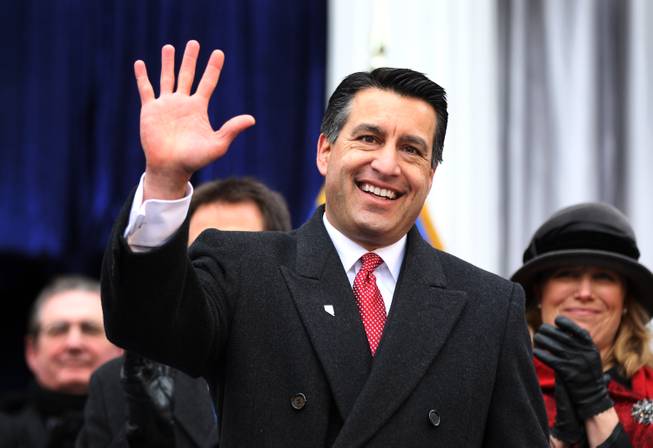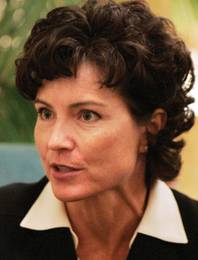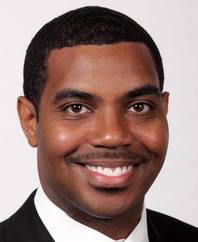
AP Photo/Cathleen Allison
Gov. Brian Sandoval waves to the crowd following Monday’s inauguration ceremony, Jan. 3, 2011 at the Capitol in Carson City.
Friday, Jan. 7, 2011 | 2 a.m.
Tuition hikes
KSNV coverage of Gov. Brian Sandoval's proposal to raise tuition at Nevada colleges and universities, Jan. 6, 2011.

Heidi Gansert

Steven Horsford
Sun coverage
Sun archives
- Sandoval suggests ‘significantly higher’ fees for higher ed students (1-5-2011)
- Sandoval increasingly isolated in his anti-tax stance (12-29-2010)
- State has upper hand in budget turf war (12-27-2010)
- Sandoval to build own budget (12-22-2010)
- Panels propose ideas to squeeze state budget (12-4-2010)
- Sandoval budget assumes 10 percent cut to state, higher ed and furloughs (12-2-2010)
- Polished knife still cuts deep into state’s budget (11-28-2010)
- Expect Sandoval to flex his newfound political capital on his anti-tax pledge (11-10-2010)
- Let Sandoval take heat for budget, Democrats say (11-5-2010)
Gov. Brian Sandoval’s guiding philosophy in building a state budget has been his promise not to raise taxes or fees.
In this economy, he argues, businesses and families just can’t afford to pay more to fund their government. Except, that is, for students.
Sandoval this week suggested to higher education officials that they could “significantly” increase tuition to colleges and universities to offset his proposed cuts in state funding, according to higher education officials.
They were unhappy, wondering why they appeared to be exempt from Sandoval’s viewpoint on the budget and economy.
“The statement that Nevada can’t afford higher taxes, but (higher education) can afford higher fees is hard to understand,” said Gregory Brown, a professor at UNLV and vice president of the Nevada Faculty Alliance. “It runs counter to principles he seems committed to.”
It’s not the first inconsistency in Sandoval’s ideology, which he has embraced with surprising gusto since entering the race for governor in September 2009.
Before the election, Sandoval said he would support passing state services on to local governments. In exchange, he said, he would allow cities and counties to raise taxes and fees.
Sandoval’s chief of staff, Heidi Gansert, said there have been no recent discussions about giving local governments the power to raise taxes. Cities and counties need approval from the Legislature to raise money.
But, she noted, the Nevada System of Higher Education has the option of raising fees and tuition to offset cuts. Sandoval supports giving the universities and colleges the power to keep those increased fees, which return to the state’s general fund.
“They’re going to have to decide, when looking at their budget, if they can live with the cuts,” Gansert said. “They’re one of the unique areas where they can raise fees.”
She said Nevada’s colleges and universities charge low tuition compared with similar institutions in other states. That means taxpayers subsidize the institutions more than in other places.
“This governor has been clear he will not raise any fees or new taxes, to make sure the economy recovers as quickly as possible,” Gansert said.
Asked if Sandoval would consider raising other fees or taxes if Nevada’s are low compared with other states, Gansert said, “I haven’t seen those charts.”
Senate Majority Leader Steven Horsford, D-Las Vegas, said Sandoval’s suggestion that the university raise tuition “is shifting the problem to others, rather than owning it and dealing with it straight on.”
Horsford, who put himself through UNR, said, “I’m concerned that for every percent tuition is increased, a middle-income family or students putting themselves through college won’t be able to attend.”
Fees have become a sticky wicket for Nevada’s conservative politicians, as they try to find what sources of revenue are acceptable to the vocal budget hawks.
In February’s special session to balance the budget, legislators — including then-Minority Leader Assemblywoman Gansert — signed off on a combination of cuts and fee increases to close an $830 million budget gap.
Sandoval attacked then-Gov. Jim Gibbons for agreeing to raise those fees.
At other times, industries have volunteered to pay higher fees to cover the cost of regulation. Sandoval has promised not to raise those fees, either.
At the tail end of the Gibbons administration, it was working closely with Sandoval’s staff. Gibbons’ former chief of staff, Robin Reedy, made plain her disagreement with Sandoval’s staff over fees.
“If a fee is for a service that is basically helping a segment of either society or business, capitalism means they should pay that cost of doing business,” Reedy told the television show “Nevada NewsMakers,” according to the Nevada News Bureau.
The conservative Nevada Taxpayers Association supports fees “where a fee charged provides a specific service to a specific group of individuals, and is not used to support the general fund,” said Carole Vilardo, the group’s president.
Conservative groups have generally supported increasing higher education tuitions, because it is akin to paying for a service, such as fees charged to hold a party at a park.
But Brown said that approach ignores the broader benefits of higher education to the state.
“Higher education is demonstrably a public good,” he said. “It brings a benefit to the economy, to the society, to the well-being — physically, culturally — of the whole far beyond one individual.”
Nevada has a poor ranking nationally on indicators for higher education. Some business and community leaders have said that hurts the state’s chances at economic diversification.
The state is 46th nationwide in higher education funding per capita; 45th in residents with a bachelor’s degree; and 41st in the number of 18- to 24-year-olds who enroll in state universities.
Jim Richardson, a UNR professor and longtime lobbyist for the Nevada Faculty Alliance, said the size of any tuition increase needed to make a dent in the state’s budget deficit would be too great.
“This would be a heavy hit and a shift of burden to parents and sons and daughters of Nevadans,” Richardson said. “It’s too much. It would drive people away, discourage them from attending higher education institutions in the state.”
Average in-state tuition is about $5,600 per year at UNLV and UNR. That figure excludes books, room and board, lab fees and other costs, according to a higher education spokesman. Average yearly tuition for the College of Southern Nevada is $2,243.
But that represents a large increase from where it was a few years ago. Tuition for university undergraduates has increased 50 percent since the 2006-07 school year; for graduate students, it has increased 60 percent; for community colleges the fees have increased 32 percent.
Chancellor Dan Klaich and regents Chairman James Dean Leavitt met Wednesday with Sandoval and his senior staff in Carson City.
“The reality we’re facing as a state and a system of higher education is bleak,” Leavitt said. “We told him further cuts would cause irreparable damage to the system.”
Leavitt said students “should expect significantly higher fees.” He wouldn’t be more specific, saying “ ‘significant’ is scary enough.”
Sandoval has not said how he plans to balance the budget without new or higher taxes and is not required to until Jan. 24.
Sandoval thinks any increase in tuition should be coupled with scholarship programs or increased student access to federal aid, Gansert said.

Join the Discussion:
Check this out for a full explanation of our conversion to the LiveFyre commenting system and instructions on how to sign up for an account.
Full comments policy